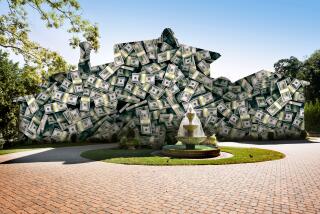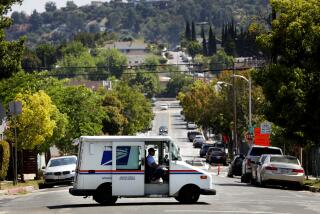‘Black tax’ -- the tithe that binds
THE TAX MAN recently paid me a nighttime visit on a public street in South L.A. His levy came as I sat in my parked car on Martin Luther King Jr. Boulevard near Crenshaw. King runs between where I live in View Park and where I work at the USC School of Law. I had legally curbed my German car to search my navigation system for a point of interest when a police cruiser pulled alongside and flooded my passenger compartment with a searchlight.
What followed was a scenario common nearly to the point of banality in this aggressively policed community: brusque questions, testy answers, brinkmanship. Because my tags, insurance and license passed muster, I avoided eating any fines but nevertheless had to swallow the indignities that come with once again being called on to pay the “black tax.”
The black tax is the price blacks (and other minorities) pay in our daily lives because of racial stereotypes. Like a tax, racial discrimination is persistent, pervasive and seemingly inevitable -- as in “Nothing in life is certain save death and taxes.” And just as the state collects general taxes, blacks often regard state representatives such as police and judges as IRS agents for the black tax.
But while tax regimes are typically either regressive (falling mainly on the poor) or progressive (falling mainly on the privileged), the black tax falls on both as indifferently as rain.
It falls on poor minorities in the redlining -- charging higher prices -- in their neighborhoods by services ranging from banking to pizza delivery; in the greater exposure to environmental toxins, and in the greater concentration of crumbling schools and hospitals.
The black tax also falls on privileged minorities -- those who parlay diplomas, athletic ability or big box office into impressive portfolios, “desirable” ZIP Codes and pricey schools -- in the profiling that their pedigrees won’t ward off. Neither my Harvard and Berkeley degrees nor chaired law school professorship gained me a tax exemption. The face of crime for most Americans is black.
The reservoir of resentment and distrust that has accumulated in the black community because of police practices such as racial profiling can be seen in the fate of Measure A, the 2004 ballot initiative that would have provided funding for an additional 1,260 officers by boosting local sales taxes. According to analyses by The Times, Measure A failed because precincts with a high concentration of black voters (along with the anti-tax votes of the west San Fernando Valley) didn’t support it. Largely Latino neighborhoods on the Eastside with crime problems similar to those of the heavily black precincts, however, did overwhelmingly back the additional tax.
Paradoxically, then, one of the communities that most desperately needed more effective policing helped sink it. But many blacks did not -- do not -- want to trade more public safety for less personal dignity. We hesitate to apply the black tax to ourselves.
Even though inherently unjust, the black tax has one silver lining -- it keeps the fate of black “haves” indissolubly wedded to that of black “have-nots.” In “Rage of a Privileged Class,” Ellis Cose chronicles the frustration, resentment and anger that being racially profiled stirs in privileged blacks.
In this view, the indignities that respectable blacks suffer because of profiling can be blamed on black criminals, most of whom are poor. If only poor blacks would stop behaving badly, they would stop fueling the stereotypes that keep the black bourgeoisie from enjoying its full measure of respectability.
This logic lies behind much of the vitriol Bill Cosby -- a black Brahmin icon -- levels at low-income blacks; it lies also behind the call of neoconservative blacks for the black community to pursue politics of respectability whereby we distinguish between “good Negroes” (law-abiding blacks) and “bad Negroes” (those who commit crimes), then clearly condemn and distance ourselves from the bad ones. Some will protest that they are not damning all poor people when they condemn criminals; they are merely blaming people who make bad choices. But this account fails to recognize that when people have only bad choices, they tend to make bad choices.
Until the conditions that breed bad choices are changed, the statistical justifications for the black tax will persist. We in the black middle class must focus our energies on improving those conditions rather than on vainly trying to distinguish ourselves from them. .
More to Read
Get the L.A. Times Politics newsletter
Deeply reported insights into legislation, politics and policy from Sacramento, Washington and beyond. In your inbox three times per week.
You may occasionally receive promotional content from the Los Angeles Times.










